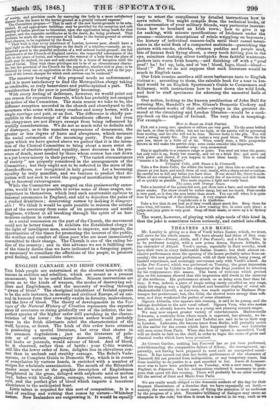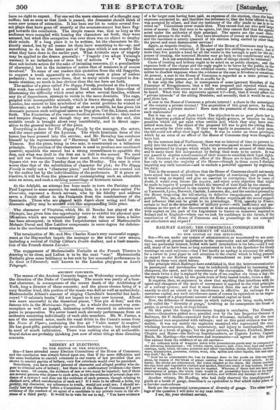We are really much obliged to the dramatic authors of
the day for their frequent illustrations of a doctrine that we have repeatedly set forth,— namely, the necessity, in most cases, of fixing the attention of an audience by the progress of a plot. Excessive brilliancy of dialogue may cause an exception to the rule; but then it must be a marvel in its way, such as we have no right to expect. For one act the mere statement of a thought may suffice; but as soon as that limit is passed, the dramatist should think of some new means of attraction. It has been our lot to notice several five- act plays that have gone off smartly at the commencement but have flag- ged towards the conclusion. The simple reason was, that as long as the audience were occupied with hearing the characters set forth, they were amused, but whe' this occupation was over there was no object to employ their minds. If a long piece is to be written, let the characters be dis- tinctly stated, but by all means let them have something to do—ay, and something to do in the latter part of the piece which is not exactly like what they have done in the earlier part. What Aristotle says of tragedy may be applied to the drama generally: " Tragedy (we adopt Twining's version) is an imitation not of men but of actions. * * * Tragedy does not imitate action for the sake of imitating manners, e. peculiarities of character,) but in the imitation of action that of manners is of course involved." To some of our, readers this quotation from the old Stagyrite, to support a truth apparently so obvious, may seem a piece of useless pedantry; but we can assure them, that to many minds occupied in dra- matic creation, no truth is less obvious than the one here set forth. The author of a piece called The Happy Family, produced at the Lyceum this week, has evidently had a certain fixed notion before him—that of illustrating the difficulty which must arise when several families, without any tie of dependence, attempt to reside in the same domicile. The cage, peopled with incompatible animals, which is drawn through the streets of London, has seemed to him symbolical of the social problem he wished to illustrate; and, to make the analogy as close as possible, he has given his dramatis personae such zoological names as Dog-gins, Cat-lin, Linnet, and so Forth. The Fourierism of the various families proves a failure: their tastes and tempers disagree; and though they are reconciled at the end, this amiable result is brought about very inartificially, and in direct oppo- sition to the general tendency of the piece. Everything is done for The Happy Family by the manager, the actors, and the scene-painter of the Lyceum. The whole histrionic force of the house has been pressed into the service; and Mr. Beverley has outshone himself by his representation of "Harmony Hall" on the banks of the Thames. But the piece, being in two acts, is oonstructed on a fallacious principle. The position of the characters is used to produce one continued quarrel; squabble the second has' a strong reeemblanci to squabble the first, and what was droll in the first act is dull in the second. We need not tell our Westminster readers how much less exciting the Trafalgar Square riot was on the Tuesday than on the Monday. The case is even worse than that of the substitution of character for plot; for The Happy Family is really not a "character piece," and the varieties are created not by the author but by the individualities of the performers. If it prove at- tractive, it will be from the pleasure of contemplating such an admirable miss en scene, and such a striking assemblage of histrionic talent.



























 Previous page
Previous page